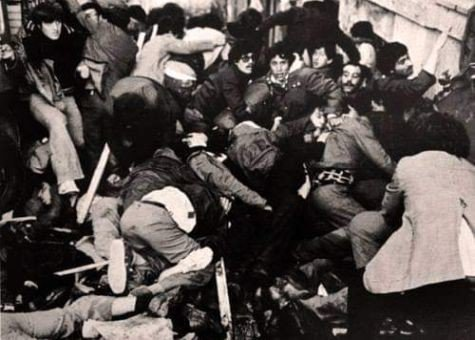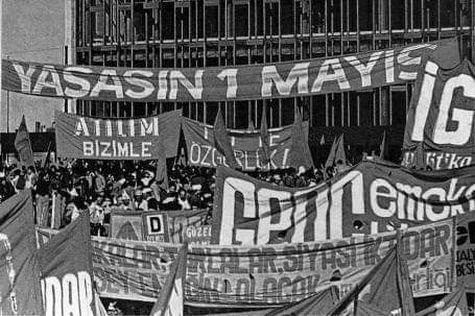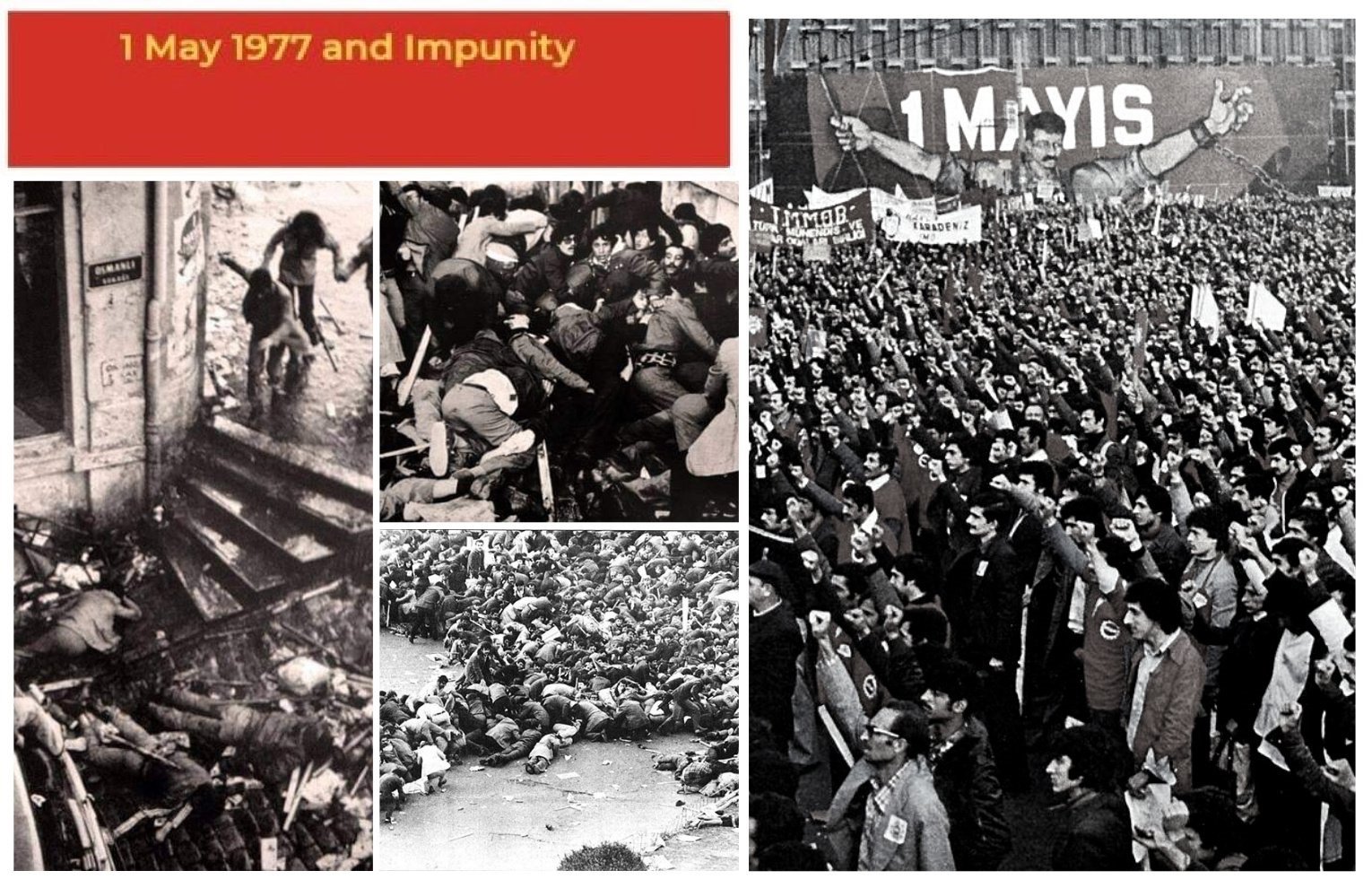Click to read the article in Turkish
"We now know why 27 of the people killed were in Taksim that day, we know about the lives they led, the jobs they did, what brought them joy!"
Yes, the First of May, Taksim Square, this city, this country, the working class, they also have a history, a memory. It is a memory under threat of being erased for the benefit of capital and the ruling class.
Because it is possible for those who produce all of the values and the beauty in this country to be socially, politically, and culturally disregarded by depriving them of their memory and their history.
That is why it is absolutely vital that our memory and our history, which are filled with our rage, our traumas, our struggles, our hopes, and our dreams, are kept alive and not forgotten.
Beyond just names and numbers
The efforts of Tuğçe Yılmaz, who meticulously uncovered the history of the massacre that took place 43 years ago, and the stories of those we lost in that massacre, and bianet's contribution to preserving that memory, are already inscribed in the history of our struggle to uncover and preserve memory...
We now know those we lost on 1 May 1977 as more than just names and numbers, but as actual people: industrial labourers and health workers, teachers and students, itinerant salesman and bakery counterperson alike.
We learned of their lives and their struggles, and saw once again that they worked just like us, that they lived just like us, and that they shared the same hopes and dreams as us...
The same hopes that we work to bring to fruition today, are the hopes that bloomed on the First of May Square in 1977. Those who wished to lead a decent life while themselves producing the values and beauties of this country, those who were engaged in the struggle for peace and fraternity, and for democracy in the face of fascism, and of course those who believed wholeheartedly that they were engaged in the creation of a new Turkey, a new world, that put labour first, were on the First of May Square that day.
That day

On 1 May 1977, Kemal Türkler made history when he asked, "Do you want the name of this square to be changed to the First of May Square?" and hundreds of thousands of people yelled out in impassioned response, "Yes!" That day, Taksim became the First of May Square.
Present also at this massive referendum were the representatives of the existing system, that is to say, of capital and its components of exploitation, poverty, imperialism, fascism: They were in the rooms of the Intercontinental Hotel, from which the first volley of gunfire was unleashed upon the crowd, on the top floor of the building that housed the Pamuk Apothecary, and on top of the Water Administration Building.
They were in that infamous white Reno that proceeded from Gümüşsuyu down Sıraselviler Boulevard, firing bullets all along the way... And in the tanks that set off sound bombs to drown out the cries from the podium telling the people, "Don't panic!" The same tanks that did not hesitate to run straight over the workers, crushing them there that day...
The aftermath
And in the aftermath, we saw the system composed of exploitation, poverty, imperialism, fascism, that is to say, of capital, in the newspaper headlines that blamed the dead, in the speeches of politicians who pointed fingers at Kemal Türkler, at DİSK, and at the CHP mayor Ahmet İsvan, making them into targets. We saw it in the police raids in which those who survived the massacre, and even those injured in it, were taken into custody, and in the courtrooms of the trial for the massacre, where workers were the ones being put on the stand and tried.
The aftermath kept coming... We saw this system, the perpetrator of the massacre of 1 May 1977, in attacks upon workers' tents during strikes, at the Maraş massacre, in the bullets fired at Kemal Türkler, and in the coup of September 12 1980. We saw it again when leaders of DİSK, including most prominently DİSK President Abdullah Baştürk, were tried, the sentence sought being that of execution.
Yes, the massacre of 1 May 1977 was the capitalist system's response to a growing, increasingly powerful worker's struggle that was organising to protect its rights, and to demand new rights, a struggle that believed wholeheartedly that it could even rebuild this country, and the world, according to the principles of labour.
The main goal of this response was to ravage the working class's economic, democratic, and political organisations, thereby making it possible for capital to create a world in its own image.
The objective of this response was to pave the way for an openly fascist system, that is, the military coup of 1980, after which the decisions of 24 January 1980 would be passed and implemented, in what is considered a landmark for neoliberal policies. The massacre of 1 May 1977 became one of the most important stepping stones that brought Turkey closer to becoming the kind of country that organisations such as the CIA and counterinsurgency forces wished to create, and ultimately paving the path to the fascist coup of 1980.
When no one is held accountable...

It is because no one was held accountable for 1 May 1977 that our country, which has endured unbearable pain, has had to, and continues to, bear even more pain, and be subjected to more massacres.
The fact that those who attended the funerals of the victims of the Ankara Massacre of 10 October, one of the largest massacres in the history of the Turkish Republic, were themselves held to blame, that those who survived were arrested, that memorial services for the dead were met with jeers, and that meanwhile, not so much as an inquiry was held about the public officials who, to put it more than lightly, clearly exhibited "negligent behaviour" that helped to facilitate the massacre, are all continuations of the ruthless response to 1 May 1977.
Today this country suffers under the weight of the painful consequences of that salvo of bullets shot from the rooftop during the massacre of 1 May 1977. The consequences of those bullets, which began right there and then, are still being experienced in the form of poverty, crippling debt, unemployment, and precarity experienced by all segments of society that make a living from their own labour, taking various forms over the last half century to exploit in every way possible the working class, labourers, the unemployed, women, the youth, and white- and blue-collar workers alike.
The working class faces all manner of obstacles that keep it from organising, thanks to which it is marketed to international capital under a banner declaring, "Come, we have the cheapest workers in the world!" This, in a homeland that, together with its labour, its cities, and its nature, is "up for sale at a bargain rate."
The willpower of the First of May 1977
On the other hand, the willpower that was targeted by the bullets in Taksim Square on 1 May 1977, continues to exist, resisting all manner of massacres, oppression, and restrictions. We see that willpower in the memory of Abdullah Baştürk, who screamed during his post-coup trial, "The only thing you will hang is my jacket." We see it in the struggle put forth by those we lost as they filled the squares of the First May in 1988, 1989 and 1996, in the courage of those who resisted in the face of all manner of oppression in 2007 and 2009, declaring that "Taksim is the First of May Square", and in the glory of the hundreds of thousands who filled the First of May Square in Taksim in 2010, 2011 and 2012. We see it in the hope that spread, in 2013, from the Gezi Park protests throughout the rest of the country as the people declared, "Everywhere is Taksim, the resistance is everywhere". In every workers' strike, in every act of resistance, in every heart that does not surrender, we see that willpower.
This is why tracing the history of this massacre, 43 years on, sheds light on the past, and illuminates the tunnel in which we presently find ourselves, it helps us to stay on course as we establish a land and a world that put labour first.
This is why, once again, we thank you, bianet...
(AÇ/TY/APA/VK)
Those whose friends and families we were unable to find Aleksandros Konteas (57, Labourer) Istanbul-Fatih Ramazan Sarı (11, Student) Istanbul-Küçükçekmece Leyla Altıparmak (19, Nurse) Diyarbakır The DİSK list Ali Yeşilgül, Bayram Sürücü, Mehmet Ali Kol, MUstafa Ertan, Özcan Gürkan, Tevfik Beysoy, Yücel Elbistanlı. |
 |
| This text was created and maintained with the financial support of the European Union provided under Etkiniz EU Programme. Its contents are the sole responsibility of "IPS Communication Foundation" and do not necessarily reflect the views of the European Union. |
CLICK - 1 May 1977 e-book is online
The ones who lost their lives on 1 May '77The ones whose loved ones we could talk to: Ahmet Gözükara (34, teacher), Ali Sidal (18, worker), Bayram Çıtak (37, teacher), Bayram Eyi (50, construction worker), Diran Nigiz (34, worker), Ercüment Gürkut (27, university student), Hacer İpek Saman (24, university student), Hamdi Toka (35, Seyyar Satıcı), Hasan Yıldırım (31, Uzel worker), Hikmet Özkürkçü (39, teacher), Hüseyin Kırkın (26, worker), Jale Yeşilnil (17, high school student), Kadir Balcı (35, salesperson), Kıymet Kocamış (Kadriye Duman, 25, hemşire), Kahraman Alsancak (29, Uzel worker), Kenan Çatak (30, teacher), Mahmut Atilla Özbelen (26, worker-university student), Mustafa Elmas (33, teacher), Mehmet Ali Genç (60, guard), Mürtezim Oltulu (42, worker), Nazan Ünaldı (19, university student), Nazmi Arı (26, police officer), Niyazi Darı (24, worker-university student), Ömer Narman (31, teacher), Rasim Elmas (41, cinema laborer), Sibel Açıkalın (18, university student), Ziya Baki (29, Uzel worker), The ones whose loved ones we did/could not talk to: Aleksandros Konteas (57, worker), Bayram Sürücü (worker), Garabet Akyan (54, worker), Hatice Altun (21), Leyla Altıparmak (19, hemşire), Meral Cebren Özkol (43, nurse), Mustafa Ertan (student), Ramazan Sarı (11, primary school student) The ones only the names of whom are known: Ali Yeşilgül, Mehmet Ali Kol, Özcan Gürkan, Tevfik Beysoy, Yücel Elbistanlı The one whose name is unknown: A 35-year-old man |
The voices of those who lost their loved ones: 1 May '77 and impunity
Political panorama of Turkey-1977
Film industry worker Rasim Elmas, 41, died in Taksim
Construction Worker Bayram Eyi, 50, died in Taksim
Teacher Bayram Çıtak, 37, died in Taksim
High School Student Jale Yeşilnil, 17, died in Taksim
Teacher Kenan Çatak, 31, died in Taksim
Teacher Ahmet Gözükara, 33, died in Taksim
Teacher Hikmet Özkürkçü, 39, died in Taksim
Student-laborer Niyazi Darı, 24, died in Taksim
University student Nazan Ünaldı, 19, died in Taksim
Teacher Ömer Narman, 31, died in Taksim
Laborer Ali Sidal, 18, died in Taksim
Counterperson Kadir Balcı, 35, died in Taksim
Student Hacer İpek Saman, 24, died in Taksim
Factory Worker Kahraman Alsancak, 29, died in Taksim
Laborer Hüseyin Kırkın, 23, died in Taksim
Student Ercüment Gürkut, 26, died in Taksim
Public order police officer Nazmi Arı, 26, died in Taksim
Laborer Mahmut Atilla Özbelen, 26, died in Taksim
Factory worker Hasan Yıldırım, 31, died in Taksim
Itinerant salesperson Hamdi Toka, 35, died in Taksim
Security Guard Mehmet Ali Genç, 60, died in Taksim
Factory Worker Ziya Baki, 30, Died in Taksim
Laborer Mürtezim Oltulu, 42, Died in Taksim
Teacher Mustafa Elmas, 33, Died in Taksim
Student Sibel Açıkalın, 18, died in Taksim
Laborer Diran Nigiz, 34, died in Taksim
1 May 1977 & Impunity
'The state is implicated in this crime, perpetrators must be put on trial'
'If you can't find the killers, you can't remove the stain'
'The perpetrators of the 1 May 1977 massacre got away with it'
Remembrance as a matter of dignity and the fight against impunity
Who is hiding the truth and why?




.jpg)
